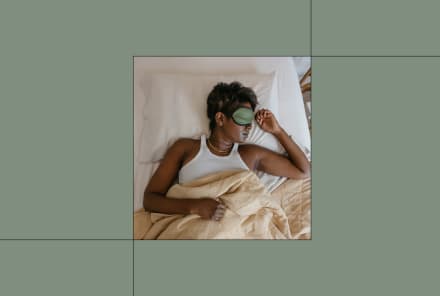Advertisement
8 Health Benefits Of Lavender Essential Oil & Exactly How To Use It


If you're looking to calm both the body and the mind (and let's face it—we could all benefit from a little R&R), look no further than the classic essential oil: lavender oil. While the pretty purple plant itself is a sight to see, its versatile essential oil is where the healing powers are at. From your head to your toes, lavender oil can help you de-stress, decompress, and develop your healthiest routines yet.
What exactly is lavender oil?
Lavender oil, also known by its scientific name Lavandula angustifolia1, is a type of essential oil derived from—you guessed it—the lavender flower. Although it's now grown globally, lavender is native to the Mediterranean, the Arabian Peninsula, and Russia.
The oil is extracted by a steam distillation process, in which the flowers are steamed, the steam is captured, and the oil is separated and collected from the water. You can usually find lavender oil at health food stores, or even drugstores, located near the other essential oils.
Health benefits of lavender oil
Essential oils and aromatherapy have gained quite the reputation for being a go-to in holistic health. Essential oils are the liquid extracts of plants, which can be used to help with everything from stress to sleep, hormone health to home cleaning, and beyond. But each essential oil is unique and offers its own specific benefits. Here's what you need to know about how one of the most popular essential oils, lavender oil, can promote well-being:
It helps you catch up on sleep.
Any way you spin it, the foundation of a healthy lifestyle starts and ends with sleep. If you find yourself tossing and turning at night, research suggests that lavender oil may be your saving grace: One study found that several whiffs of lavender oil before bed increased the percentage of deep sleep time2 in healthy men and women. It even has beneficial effects for those who suffer from insomnia—a study found that inhaling lavender oil twice a week for 20 minutes at a time soothed the nervous system and improved sleep quality scores3 for women with insomnia when compared to a lavender-oil-free control group.
mbg tip
It helps manage stress.
The soothing powers of lavender oil don't stop there. In one study, researchers found that lavender oil could go toe-to-toe against a prescription medication4 for general anxiety. For six weeks, one group of participants took the anxiety-reducing medication Lorazepam while another group took an oral dosage of lavender oil. At the end of the trial period, both groups reported an almost identical decrease in anxiety—45% and 46%, respectively. When it came to more extreme conditions, the oil still proved effective: A 2017 study5 found lavender aromatherapy even calmed anxiety levels in preoperative patients.
It soothes angry skin and can help with bug bites.
Just as lavender oil can soothe the mind, it can also do wonders for calming the body. In particular, not-so-fun skin flare-ups like eczema and psoriasis have responded well to the anti-inflammatory properties of lavender oil. A review of the most popular essential oils and their functions in dermatology cited lavender oil's ability to calm irritated skin6 when used topically. What's more, the oil's de-stressing qualities come in handy for psoriasis, in which flare-ups are often triggered by anxiety.
It can even be used as a natural alternative for healing pesky bug bites—when mixed with a little baking soda and applied to the bites, you'll hardly even notice they're there.
It can combat fungal infections.
What do yeast infections, athlete's foot, and ringworm all have in common? They're each a different form of fungal infection, which occurs when annoying fungi develop in or on damp parts of the body. Lavender oil has both antibacterial and antifungal properties, which could help clear these up. In fact, it was shown to fend off candida (the culprit behind yeast infections) in one lab study7.
However, it is important to note that this was a preliminary in vitro study, meaning infected cells were combined with lavender oil in a test tube for observation. Do not topically apply lavender oil, or any essential oil for that matter, to your vagina since the pure form is too strong and can burn. These types of studies help inform researchers about the properties and potential uses of substances, but more research is needed to understand how lavender oil can be used on fungal infections in the future.
It may help prevent hair loss.
While the research is still preliminary, one animal study8 showed that applying lavender oil once a day for four weeks to the backs of mice stimulated hair growth on all facets: from follicle number to depth to thickness. Clinical trials in humans are needed, so the jury is still out on this one, but perhaps this is the inspiration you need to add a couple of drops of lavender to your DIY hair mask.
It has wound-healing properties.
Minor wounds, that is. One animal study found that when applied topically, lavender oil closed up wounds9 more quickly than other solutions, such as saline and iodine over the course of a five-day period. Researchers chalked this phenomenon up to improving the quantity of EGF, or epidermal growth factor, in the skin, which is necessary for regenerating tissue. The catch: Once again, the study was conducted on animal subjects, so more rigorous clinical trials are needed before we start hailing lavender oil as the next Neosporin.
It can help ease a headache.
Pounding head? Try a whiff of lavender. A study10 looking at 47 patients who suffered from regular migraines prescribed one-half of the group regular 15-minute lavender-smelling sessions while the other half inhaled a placebo. The effects were immediate and lasting: Researchers found that those in the experimental group reported significantly less severity of migraine attacks for the next two hours.
It gives you a natural glow.
Lavender oil is lauded for both its antioxidant and anti-inflammatory11 effects, which makes it a quality contender to include in your clean skin care routine. Antioxidants are known to fight off the free radicals that can send your skin into a tizzy by impairing mitochondrial function and speeding up the process of aging. Including a drop or two of lavender oil into your favorite lotion or face cream will give your skin a boost of antioxidant power before bed (and will add a touch of soothing aromatherapy to your nighttime routine).
Before hailing this floral concoction as a miracle oil, it's important to note that more rigorous clinical trials are necessary before it should be treated as a prescriptive gospel. That being said, the work that has been done to put lavender oil to the test has generated some pretty impressive health benefits.
OK, how exactly do I use or apply lavender oil?
Just as there are myriad benefits of lavender oil, there are myriad ways to use it. It's typically used topically for skin and hair health although methods can differ based on your preferred ways of application. It's wise not to go too heavy-handed with the oil—since it's highly concentrated, two or three drops are most likely all you need.
When it comes to your skin, dilution is important: The oil can be applied topically to help with irritated or inflamed skin but only if it has been diluted in a "carrier oil" or neutral, minimally processed oil such as coconut, argan, or olive. The mixture can be used just as you would a lotion or moisturizer, once or twice daily. For hair health, you can massage a couple of drops of lavender oil into your scalp as a calming end to the day, or add two or three drops to each dollop of shampoo or conditioner you use.
If it's improving anxiety or getting a sound night's sleep that you're after, putting your oil in a diffuser is your best bet. There are a few ways to use the scent of lavender for your benefit, one of the most popular being diffusion. Essential oil diffusion consists of using a small device to disperse particles of oil into the air, allowing for easy inhalation. If you'd rather not diffuse, a few deep inhales of the scent before bed (or anytime you need a moment of calm) will do the trick. You can even draw the perfect calming herbal bath using a few drops of lavender to soak your stresses away.
How to find high-quality lavender essential oil
Whenever you're purchasing an essential oil, it's important to look out for certain things on the bottle. You can tell an oil is high-quality if it lists both the common and scientific name of the active oil(s) and any carrier oils, has the word "therapeutic" on the label, and comes in a dark glass bottle that keeps light from entering—which can mess with the oil's efficacy. Be sure to check the expiration date, too! It's a relatively affordable essential oil because of the way the lavender plant is extracted, so a low price isn't necessarily a red flag.
Summary
Potential side effects to look out for
If you're ready to dive into the lavender lifestyle, there are still a couple of factors to consider. Some side effects include skin irritation or an allergic reaction, so putting a patch test on your skin before use can save you some trouble. Just as with any new supplement, chatting with a medical professional before use is recommended. Though lavender oil is safe for most individuals, women who are pregnant or breastfeeding should consult with a doctor.
11 Sources
- https://www.sciencedirect.com/topics/pharmacology-toxicology-and-pharmaceutical-science/lavandula-angustifolia
- https://www.tandfonline.com/doi/abs/10.1080/07420520500263276?journalCode=icbi20
- https://www.ncbi.nlm.nih.gov/pmc/articles/PMC3159017/
- https://www.ncbi.nlm.nih.gov/pubmed/19962288
- https://www.ncbi.nlm.nih.gov/pmc/articles/PMC5743169/
- https://www.ncbi.nlm.nih.gov/pmc/articles/PMC5435909/
- https://www.ncbi.nlm.nih.gov/pmc/articles/PMC4621348/
- https://www.ncbi.nlm.nih.gov/pmc/articles/PMC4843973/
- https://www.hindawi.com/journals/ecam/2013/361832/
- https://www.ncbi.nlm.nih.gov/pubmed/22517298
- https://www.ncbi.nlm.nih.gov/pubmed/26247152
Watch Next
Enjoy some of our favorite clips from classes
Enjoy some of our favorite clips from classes
What Is Meditation?
Mindfulness/Spirituality | Light Watkins
Box Breathing
Mindfulness/Spirituality | Gwen Dittmar
What Breathwork Can Address
Mindfulness/Spirituality | Gwen Dittmar
The 8 Limbs of Yoga - What is Asana?
Yoga | Caley Alyssa
Two Standing Postures to Open Up Tight Hips
Yoga | Caley Alyssa
How Plants Can Optimize Athletic Performance
Nutrition | Rich Roll
What to Eat Before a Workout
Nutrition | Rich Roll
How Ayurveda Helps Us Navigate Modern Life
Nutrition | Sahara Rose
Messages About Love & Relationships
Love & Relationships | Esther Perel
Love Languages
Love & Relationships | Esther Perel
What Is Meditation?
Box Breathing
What Breathwork Can Address
The 8 Limbs of Yoga - What is Asana?
Two Standing Postures to Open Up Tight Hips
How Plants Can Optimize Athletic Performance
What to Eat Before a Workout
How Ayurveda Helps Us Navigate Modern Life
Messages About Love & Relationships
Love Languages
Advertisement

This Little-Known Supplement Helps Women Sleep & Decreases Signs Of Depression
Molly Knudsen, M.S., RDN

This Little-Known Supplement Helps Women Sleep & Decreases Signs Of Depression
Molly Knudsen, M.S., RDN















